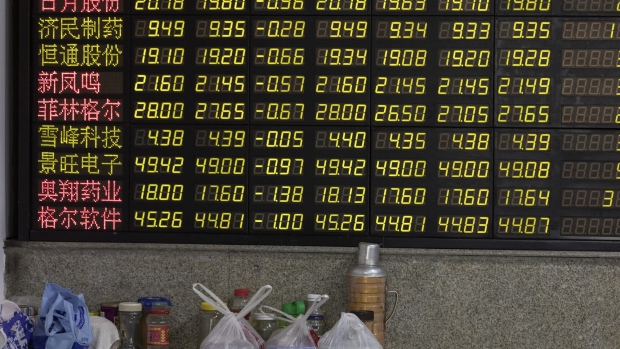Mar 9, 2023
MSCI China Stocks Gauge Erases 2023 Gains Amid Key Policy Meet
, Bloomberg News

(Bloomberg) -- For all the hype in the run-up to the National People’s Congress, China stocks bulls were left in the lurch as a terrible week for global markets compounded a selloff spurred by a lack of major policy incentives.
It all began on Monday as a consensus-lagging economic growth target of around 5% announced the previous day dashed expectations for more stimulus. While the key policy meeting brought some good news for state-owned enterprises and software developers, it fell short on big-bang incentives to boost consumption and support the key property sector.
The MSCI China Index fell each day this week to head for its worst performance since an October rout. The gauge erased all its gains for the year on Friday amid a global selloff sparked by some trouble in the US banking sector. Foreign investors sold a net $1.5 billion of onshore China shares over the past five sessions via trading links with Hong Kong.
“The National People’s Congress looks like it’s not throwing up many surprises,” said Kerry Goh, chief investment officer at Kamet Capital Partners Pte. “There’s no major policy news and earnings still have to recover in China. Up until then, the US will drive China and Asia.”
In early US trading, the Nasdaq Golden Dragon index of Chinese companies rebounded, after falling as much as 1.4%. The reversal comes as the broader US equity market pared losses.
All eyes are now on the official announcement of the prime minister — widely expected to be former Shanghai party secretary Li Qiang — and key positions including the People’s Bank of China governor over the weekend.
Traders will thus be scrutinizing Li’s press briefing on Monday to get a grasp on his stance on everything from private enterprise and financial markets to US relations. Any surprises or harsh tones may jolt markets again.
That said, as the new leadership’s policy priorities crystallize, the coming weeks may still offer some hope for traders who have seen an uncertain economic outlook evaporate some of the gains during the three-month reopening rally through January.
Seasoned watchers note fundamental changes underway that may reshape market dynamics, including renewed focus on “high-quality development”. Authorities’ emphasis on tech development and data security also gives a sense on what the next growth drivers may be.
Steep Losses
The CSI 300 Index, the benchmark for onshore China shares, fell 4% this week, more than the 2.2% average decline seen during the political gathering over the last 15 years. A weak Chinese consumer price inflation reading on Thursday added to caution about the strength of the economic recovery. The MSCI China index tumbled more than 7%.
Selloffs were deep in the consumer and property sectors, where the likes of Fidelity International and abrdn plc had expected support. A Bloomberg gauge of property developers plunged into a bear market as outgoing Premier Li Keqiang said the country will target disorderly expansion in the sector.
The wording around real estate suggests that “this could be about it in supportive measures for the sector,” said Wang Huan, fund manager at Shanghai Zige Investment Management Co. Ltd. “The task for property is to make sure it doesn’t become a drag, but right now I think even that is not guaranteed.”
READ: China Property Stocks Enter Bear Market as Policy Optimism Fades
Silver Linings
There were still pockets of strength as NPC statements showed achieving tech self-reliance is the predominant policy goal.
There’s been an emphasis on “relying more on internal demand and enhancing science and technology,” said Jian Shi Cortesi, a fund manager at Zurich-based GAM Investment Management, adding that it reaffirmed her bets on the digital security and technological self-reliance themes in China.
Shares of software developers advanced on some days as the government said it will create a national bureau to monitor data. Chip shares may benefit amid a planned expansion in the Ministry of Science and Technology’s role to foster strategic policies, particularly as the local industry faces more curbs from the West.
Separately, state-owned enterprises also had some outsized upswings on expectations of reforms.
“The biggest point of attraction leading up to the meeting was whether the theme was going to be stabilizing growth or adjusting the growth structure this year,” said Ou Xiao, fund manager at Stone PE in Shanghai. “From what’s been revealed, it looks like more of the latter, and that means new sectors” will be favored, he said.
The offshore yuan has weakened 1% versus the greenback since NPC kicked off, nearing the psychological level of 7 per dollar.
“There was little enthusiasm for some of the announcements emanating from the NPC,” Kiyong Seong, lead Asia macro strategist at Societe Generale SA in Hong Kong, wrote in a note. “With no major positive surprises from the NPC, however, the CNY will likely lag Asia FX’s recovery from the recent selloff driven by the repricing of Fed rates.”
--With assistance from John Cheng, Wenjin Lv, Yiqin Shen and Amanda Fung.
(Updates with Nasdaq Golden Dragon performance in fifth paragraph)
©2023 Bloomberg L.P.








